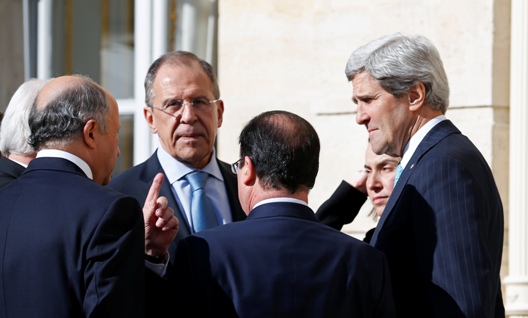
Edward Joseph, at Johns Hopkins’ School of Advanced International Studies, notes the uncertainty over Russian intentions in Syria, and over the effect of of the Russian-Ukrainian crisis on Moscow’s role in Syria. He writes that now is the time for US diplomacy to test Russia on Syria with a new diplomatic effort there. An excerpt of his essay is below, and you can read the full article on the Atlantic Council’s MENASource blog.
As outrageous and unsettling as Moscow’s invasion of Ukraine is, the fact remains that the real killing continues to take place in another area of Russian interest: Syria. Indeed, more than a quarter of the 136,000 Syrians killed in the war have died over the past five months alone. In a tragic irony, one of the most intensive bursts of lethality—thanks to stepped up aerial bombardment by the Assad regime—took place during the recent, short-lived Geneva peace talks. Whatever Russia’s professed interest in the diplomatic track for Syria, the results at the peace table were abysmal. The question now is whether Moscow’s designs on Ukraine have changed anything with respect to the three-year old conflict in Syria and the massive suffering and instability that it has spawned.
There are two distinct possibilities: The first is that Russian President Vladimir Putin’s decision to send troops to Crimea—after having earlier spoken to President Barack Obama in a conversation that the White House termed “constructive”—has finally shredded any remaining hopes the administration may have held for diplomatic cooperation on Syria. Putin’s sandbagging of the US president on Ukraine came on the heels of months of apparent duplicity from Foreign Minister Sergei Lavrov who failed utterly to live up to supposed signals of seriousness over a transition in Syria. Under this theory, both President Obama and Secretary of State John Kerry are now thoroughly disabused of the value of investing in anything that the Russians might promise on Syria, and might now consider new policy options.
At the same time, there is an alternate, skeptical view of the implications from Ukraine. However peeved the Obama administration might be at Russian perfidy in Ukraine, and however disappointed in the Geneva parley, the famously dispassionate Obama remains skeptical of any alternate course of action in Syria. Diplomacy with Russia, while frustrating, will remain the mainstay of policy along with humanitarian assistance. Indeed, some might see Russia’s gambit in Ukraine—with the attendant possibility of international isolation and unknown complications on the ground—as making Moscow more pliable on Syria. Support for this view comes in the form of the recently passed UN Security Council Resolution 2139, in which Russia finally joined with the United States and its allies to, at least rhetorically, call out the Assad regime on the worst of its humanitarian abuses and demand action. Under this theory, Russia’s need to focus on Ukraine prompted Moscow to relent a bit on its reflexive defense of Assad’s indefensible actions against his people.
Rather than conjecturing over which interpretation is correct, a better approach is to move swiftly, while the situation in Ukraine is at its most uncertain, to test Russia’s actual position on Syria. Even if the Obama administration is wedded to diplomacy with Russia, it might as well maximize whatever prospects there are (which may prove minimal) to exact Russian cooperation on Syria, simultaneously forcing Moscow to show its true cards. President Obama has already acknowledged that the diplomatic track is not working, so there is little risk for even a highly risk-averse White House in actively testing the Russians.
Image: Foreign Minister Sergei Lavrov (2nd L) and U.S. Secretary of State John Kerry (R) speak as French President Francios Hollande (C) stands between them during the Meeting of the International Support Group for Lebanon at the Elysee Palace in Paris, March 5, 2014. At left is French Foreign Minister Laurent Fabius. (Photo: REUTERS/Kevin Lamarque)

